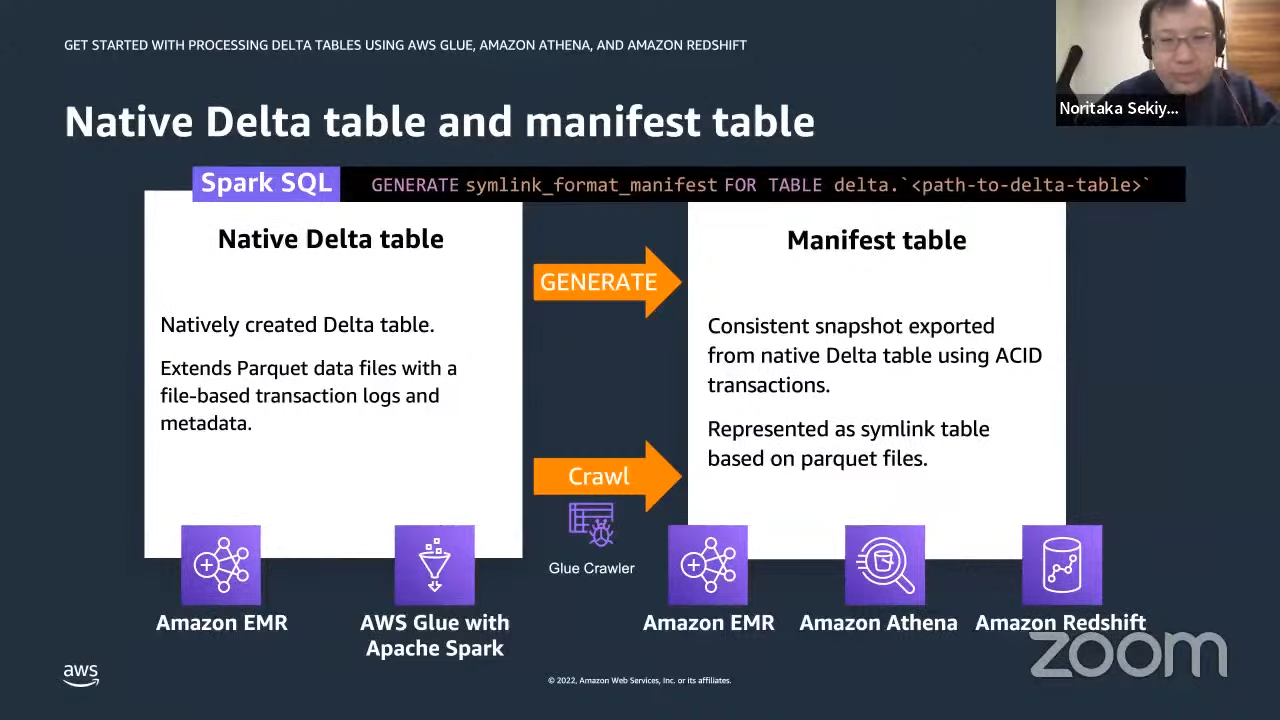Redshift
Delta to Redshift

Database
sql
create database <SCHEMA_NAME> with owner <USER_NAME>;Schema
sql
create schema <SCHEMA_NAME> authorization <USER_NAME>;
grant all on schema <SCHEMA_NAME> to <USER_NAME>;Table
WIP
Work in progress
Users
List
sql
select * from pg_user;Superuser
sql
ALTER USER "user_name" WITH CREATEUSERGroups
Create
sql
create group <GROUP_NAME> with user <USER_NAME1>, <USER_NAME2>;Add user to group
sql
alter group <GROUP_NAME> add user <USER_NAME>;Remove users from group
sql
alter group <GROUP_NAME> drop user <USER_NAME1>, <USER_NAME2>;Delete group
sql
drop group <GROUP_NAME>;TIP
If the group has privileges for an object, first revoke the privileges before dropping the group. The following example revokes all privileges on all tables in the public schema from the GUEST user group, and then drops the group.
sql
revoke all on all tables in schema public from group guest;
drop group guests;Parquet to Redshift
python
def spark_to_redshift_type(self, spark_type:str, precision:Union[str,None]):
"""
- Convert spark type to redshift type
"""
mapping = {
"integer": "INTEGER",
"long": "BIGINT",
"float": "REAL",
"double": "DOUBLE PRECISION",
"decimal": f"DECIMAL{precision}",
"string ": "VARCHAR",
"timestamp": "TIMESTAMP",
"date": "DATE",
}
return mapping.get(spark_type, "VARCHAR")
def generate_redshift_create_table(self, df: DataFrame, table_name: str) -> str:
schema = df.schema
columns = []
for field in schema.fields:
if isinstance(field.dataType, DecimalType):
precision = f"({field.dataType.precision},{field.dataType.scale})"
else:
precision = None
redshift_type = self.spark_to_redshift_type(field.dataType.typeName(), precision)
columns.append(f"{field.name} {redshift_type}")
columns_str = ", ".join(columns)
create_table_sql = f"CREATE TABLE IF NOT EXISTS {table_name} ({columns_str});"
logging.warning(f"create_table_sql: {create_table_sql}")
return create_table_sql
def execute_redshift_query(self, query: str, redshift_credentials: dict):
conn = psycopg2.connect(
dbname=redshift_credentials["dbname"],
user=redshift_credentials["user"],
password=redshift_credentials["password"],
host=redshift_credentials["host"],
port=redshift_credentials["port"],
)
with conn.cursor() as cursor:
cursor.execute(query)
conn.commit()
conn.close()And just use it like:
python
schema_table = schema + "." + table_name
create_table_sql = self.generate_redshift_create_table(df, schema_table)
self.execute_redshift_query(create_table_sql, self.redshift_credentials)Errors on copy
If you get errors like this:
sql
error: Spectrum Scan Error
code: 15007
context: File 'https://... parquet ... c000.snappy.parquet' has an incompatible Parquet schema for column 's3://'
query: 43966693
location: dory_util.cpp:1509
process: worker_thread [pid=13526]You can query the details on:
sql
select message
from SVL_S3LOG
where query = 43966714
order by query,segment,slice;